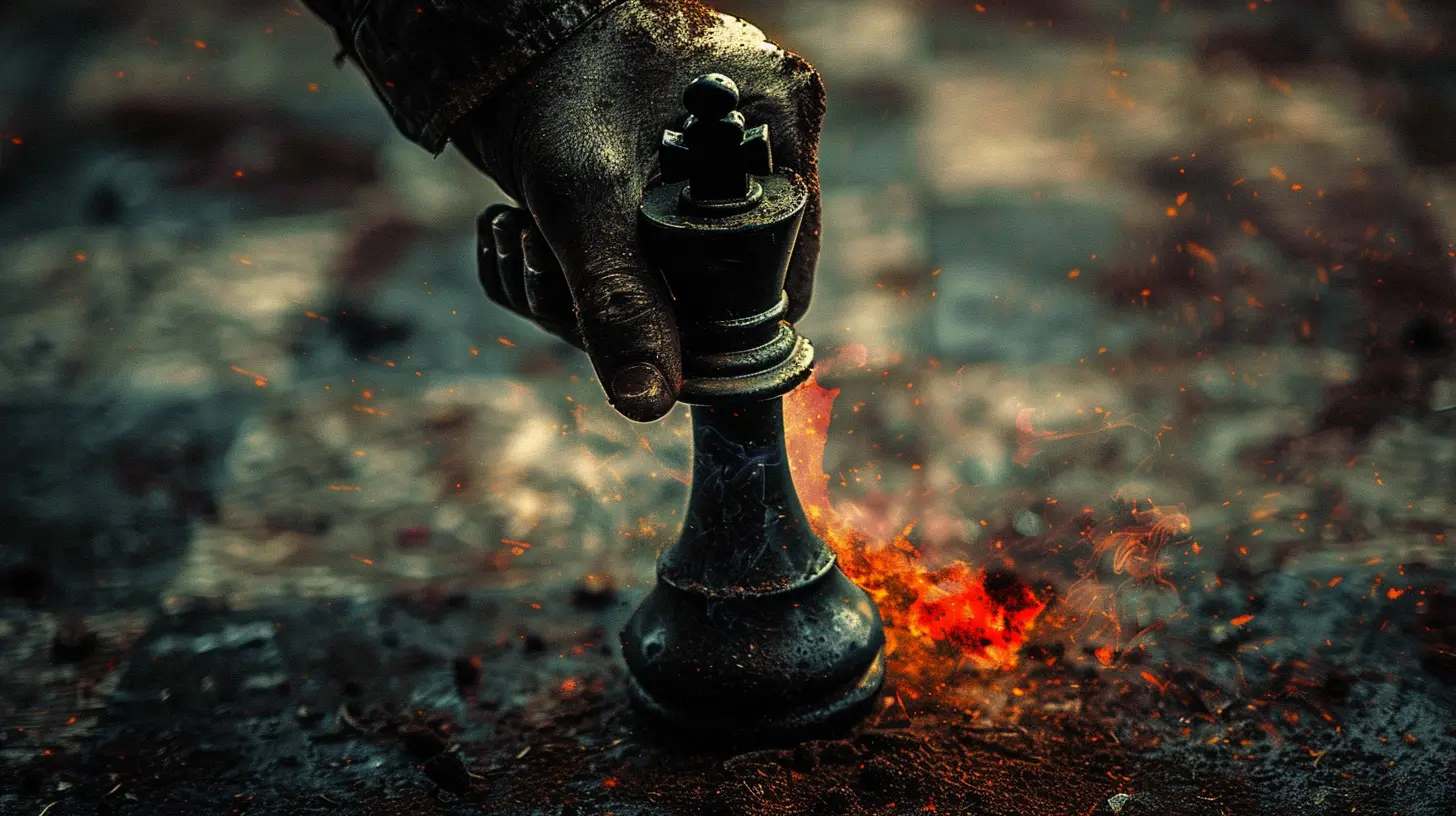When Games Punish You for Every Mistake: The Appeal of Precision
3 August 2025
Ever screamed at your screen because a game punished you for a single misstep? Yeah, we’ve all been there. Maybe you missed a jump by a pixel, mistimed a dodge, or pressed the wrong button in a moment of panic—and bam! Game Over.
Despite the frustration, many gamers keep going back for more.
There’s a strange thrill in games that are brutally precise, where every move counts, and every decision carries weight. But why do we willingly dive into games that show no mercy for mistakes?
Let’s unpack the appeal behind these punishing beasts and why they’ve carved out such a loyal following.
Precision in Gaming: What Are We Talking About?
First things first—what does “precision” even mean in the gaming world?In simple terms, precision refers to games that demand accuracy, timing, and flawless execution from the player. These games don’t hold your hand. They don’t offer second chances. There's no easy mode. You either get it right, or you're sent packing.
Think of titles like Dark Souls, Super Meat Boy, Celeste, Sekiro: Shadows Die Twice, or even the infamous Getting Over It with Bennett Foddy. Every one of these games requires you to master the mechanics, pay close attention to timing, and push through intense trial and error.
And when you mess up? You start over. From scratch. Again and again.
Sounds cruel, right? So… why in the world do people love this?
The Psychology Behind the Pain
Here’s the thing—gamers aren’t masochists. Well, not all of them.What makes these harsh games appealing lies in psychological satisfaction. When you finally nail that tricky boss battle or platforming section, the rush of victory hits differently. It’s raw. It’s earned. You fought tooth and nail for it.
Let’s break down the key reasons:
1. The Satisfaction of Mastery
You know that feeling when you finally beat a section you’ve been stuck on for hours? That’s mastery.These games are like puzzles designed to push your reflexes and problem-solving to their limits. Every time you fail, you learn. Every retry is a chance to fine-tune your approach. And every success? It feels like YOU made it happen—not the game.
Unlike games that hand out participation trophies, precision-heavy titles make you work for it. And that makes the reward so much sweeter.
2. Trial and Error Builds Grit
Instant gratification is everywhere—fast food, social media, streaming. But games that punish every mistake teach you something valuable: resilience.You fall. You try again. You slowly improve. It’s like real life, only with pixelated spikes and fireballs.
This “fail-forward” loop builds grit. It cultivates patience and determination. You don’t just get better at the game—you get better at sticking with tough challenges in general.
3. The Pure Focus
In high-precision games, there's no room for distraction. One blink, one false move, and it’s back to the start. You enter a kind of flow state—totally focused, completely immersed.That laser-sharp intensity can be incredibly satisfying. It's gaming meditation, in a weird, slightly rage-inducing way.
The Art of Game Design That Punishes Fairly
Now, let’s be clear: punishing a player isn’t the same as being unfair. Good precision games might be hard, but they’re hardly ever cheap.1. Clear Rules and Feedback
You know why you failed. You saw the mistake. The game didn’t just randomly kill you. It gave you all the tools—you just didn’t use them right… yet.Take Celeste, for example. When you die (and trust me, you will), the game instantly resets you at the start of the section. No loading screens, no penalties—that quick restart encourages you to push forward.
And every death? A lesson in disguise.
2. Tight, Responsive Controls
If a game demands precision, it better have tight controls. That’s non-negotiable. The best skill-based games feel like an extension of your nervous system. When your character jumps, runs, or attacks, it happens exactly when you tell it to.Every mistake feels like it’s on you—not the game—because the inputs are that smooth.
Games like Hollow Knight or Cuphead nail this. Their control schemes are so refined that success feels like a natural evolution of practice.
3. Signposting Without Spoiling
Great design doesn’t just throw you into the pit and laugh. It leaves subtle clues—a flickering light, a sound cue, a pattern in enemy behavior. If you’re paying attention, the secrets to surviving are there.You just need to look closer and think smarter. It trains you to be observant, to adapt, and to grow.
The Rise of Precision Games in the Indie Scene
Let’s give a quick shout-out to indie developers here. Many of the most iconic precision games come from smaller studios that dared to go against the grain.While the mainstream was chasing cinematic realism, resource management, and open-world endlessness, indie devs leaned into tight, skill-based gameplay.
Why? Because when you strip away gimmicks and bloated mechanics, you’re left with pure gameplay—and that’s where precision games shine.
Games like Dead Cells, Katana ZERO, or Hyper Light Drifter prove that you don’t need million-dollar budgets to create something addictive, meaningful, and brutally fun.
Building a Community of Struggle and Support
Interestingly, punishing games often have some of the most supportive communities around.Hop into any subreddit or Discord for a tough-as-nails game, and you’ll find players sharing tips, strategies, and encouragement like it’s a virtual locker room.
Everyone knows the pain. Everyone respects the grind. It creates a sense of camaraderie in suffering.
Games like Dark Souls even incorporate this right into the mechanics—allowing players to leave messages for each other, share secrets, or warn about traps. In a world where games punish you for every single miscalculation, these moments of shared struggle are pure gold.
Why We Keep Coming Back: The Inner Drive
Let’s be honest—there are easier ways to spend your evening. You could play cozy games, story-driven adventures, or chill simulators. So why do we keep coming back to these digital crucibles?The answer's simple: we crave growth.
Punishing games don’t just challenge your thumbs—they challenge your mindset. They tap into that primal desire to overcome, to prove you can climb the mountain, even if you’ve fallen a thousand times before.
It’s character-building. It’s empowering. And it’s a heck of a lot more meaningful than watching a cutscene play out while mashing a single button.
What Precision Teaches Us Beyond Gaming
Yeah, it’s just a game. But the mindset you build playing precision titles? It sticks with you.You start to approach problems differently. You embrace failure as part of the process. You stop expecting shortcuts and start enjoying the grind. And maybe, just maybe, you take on real-world challenges with the same fiery persistence.
Kind of wild how a pixelated ninja or angry goose can teach you life lessons, huh?
Final Thoughts: The Joy in the Pain
Games that punish every mistake aren’t for everyone—and that’s totally fine. But for those who stick with them? They unlock a one-of-a-kind experience. It’s raw. It’s frustrating. It’s exhilarating.There’s something magical about a game that says: “No freebies. Earn it.” And when you do—when you finally beat that spiked gauntlet or dethrone the unkillable boss—you feel like a champion.
Sure, you'll rage. You’ll groan. You’ll swear to never play it again. But deep down?
You’ll love every brutal second of it.
all images in this post were generated using AI tools
Category:
Game ChallengesAuthor:

Stephanie Abbott
Discussion
rate this article
2 comments
Zedric Blevins
Because who doesn't love a daily dose of frustration?
December 5, 2025 at 4:45 AM

Stephanie Abbott
True, but frustration can fuel improvement and make victories even sweeter!
Stephen Palmer
Embracing precision in gaming transforms mistakes into opportunities for growth. It's a thrilling journey where every challenge sharpens our skills and fuels our determination! Level up!
August 19, 2025 at 3:56 PM

Stephanie Abbott
Absolutely! Embracing precision not only enhances skills but also turns challenges into valuable learning experiences. It's all about growth and mastery!


